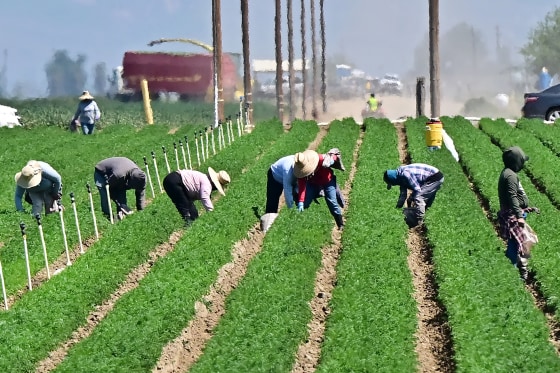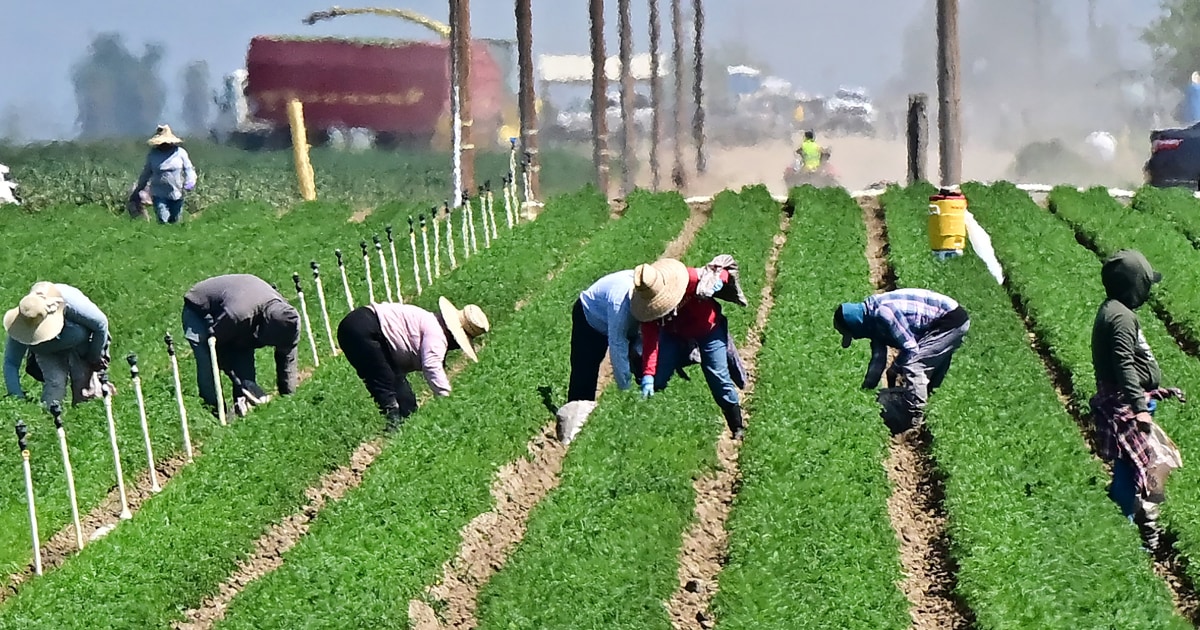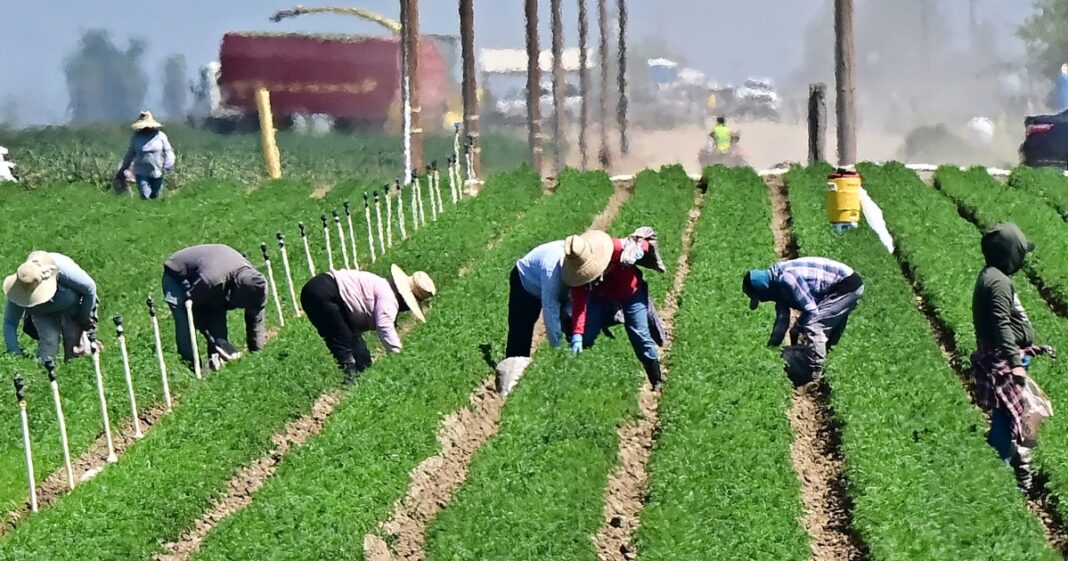The debate over immigration in the United States has always been a thorny one, fraught with emotion and complex considerations. Now, amidst the ongoing political turmoil, a new proposal has emerged, one that promises to fundamentally reshape the landscape for undocumented farm and hotel workers. Former President Donald Trump, a figure often associated with hardline immigration stances, has floated a surprising plan: granting legal status to these vulnerable workers.

Trump Floats Plan for Undocumented Farm and Hotel Workers to Work Legally in the U.S.

President Donald Trump suggested at a Cabinet meeting Thursday that undocumented people working on farms and in hotels would be allowed to leave the country and return as legal workers if their employers vouched for them.
Trump said at the meeting with reporters present that “we have to take care of our farmers, the hotels and, you know, the various places where they tend to, where they tend to need people.” “So a farmer will come in with a letter concerning certain people, saying they’re great, they’re working hard. We’re going to slow it down a little bit for them, and then we’re going to ultimately bring them back. They’ll go out. They’re going to come back as legal workers.”
It was unclear what he meant by “slow it down a little bit for them.”

The Background
The administration has been pouring resources into arresting, detaining and deporting undocumented immigrants to fulfill Trump’s campaign pledge to conduct a mass deportation of immigrants from the United States.
Trump said the administration is going to work with people if they “go out … in a nice way.” “We’re going to work with them right from the beginning on, trying to get them back in legally. So it gives you real incentive. Otherwise they never come back. They’ll never be allowed once a certain period of time goes by, which is probably going to be 60 days,” he said.
The Impact
Potential benefits for farmers and hotel owners who rely on undocumented workers
Challenges for workers who may face uncertainty and exploitation
Current Immigration Programs
H-2A and H-2B Programs
Temporary and seasonal work programs for agricultural and hospitality industries
Trump’s use of the H-2B program
Criticisms of the programs for being difficult to navigate and vulnerable to exploitation
Immigrant Advocacy
Push for better regulation of immigration programs to protect workers’ rights
Concerns about substandard living and work conditions
Administration’s Approach
The United States has programs that allow immigrants to come to the country and work, although employers often complain about the difficulties of using them.
Farmworker and immigrant advocates have often pushed for better regulation of the programs to ensure workers are not exploited or abused or thrust into substandard living or work conditions.
A White House official told Unionjournalism that Trump wants to improve the H-2A program, through which employers in the agricultural industry can hire temporary and seasonal workers, and the H-2B program, for hiring immigrant workers for temporary, seasonal jobs in other industry sectors, such as hospitality and entertainment, and in the tourism industry.
Trump has used the H-2B program.
About 40% of U.S. crop farmworkers are undocumented, according to the Agriculture Department.
About 1.1 million undocumented people worked in the hospitality industry — hotels and restaurants — about 7.6% of the workforce, in 2023, according to an analysis by the American Immigration Council, a legal group that advocates for immigration.
The administration is estimated to have deported nearly 300 people last month, most of them originally from Venezuela, to a megaprison in El Salvador.
Trump has declared the Venezuelan gang Tren de Aragua an “alien enemy,” and he invoked the Alien Enemies Act of 1789, a wartime law, to deport people immigration officials designated as members of the gang, allegations relatives of some of the deported have contested.
Immigration officers also have been arresting people at homes, schools and universities when they arrive for immigration check-ins or if they are stopped for traffic violations.
ICE said at the time that several of them were “working in the United States illegally and had convictions for crimes such as drug possession, assault, and driving under the influence.”
Demographics and Statistics
The Trump administration’s proposal to allow undocumented farm and hotel workers to work legally in the U.S. has sparked a heated debate about immigration reform. To understand the scope of this issue, it’s essential to examine the demographics and statistics surrounding undocumented workers in these industries.
Undocumented Farmworkers
According to the U.S. Department of Agriculture, approximately 40% of U.S. crop farmworkers are undocumented. These workers play a crucial role in the agricultural industry, accounting for a significant portion of the nation’s food production. The importance of farmworkers to the agricultural industry cannot be overstated, as they provide the labor necessary to harvest and process crops. Without these workers, the industry would struggle to meet the demands of the U.S. market.
A recent study by the American Farm Bureau Federation found that the average farmworker in the United States earns approximately $25,000 per year. However, many farmworkers earn significantly less, with some reports suggesting that they earn as little as $10,000 per year. This disparity highlights the need for immigration reform that prioritizes the rights and protections of farmworkers.
Undocumented Hotel Workers
According to an analysis by the American Immigration Council, approximately 1.1 million undocumented people worked in the hospitality industry in 2023, accounting for 7.6% of the workforce. These workers are essential to the operation of hotels, restaurants, and other establishments in the industry. Without them, many businesses would struggle to maintain their current level of service and customer satisfaction.
A recent report by the National Restaurant Association found that the average hourly wage for hospitality workers in the United States is approximately $12.50. However, many undocumented hotel workers earn significantly less, with some reports suggesting that they earn as little as $8.00 per hour. This disparity highlights the need for immigration reform that prioritizes the rights and protections of hotel workers.
Deportation Statistics
The Trump administration’s deportation policies have been the subject of intense controversy, with many critics arguing that they are inhumane and ineffective. According to data released by the administration, nearly 300 people were deported in February, most of them originally from Venezuela. However, immigration advocates argue that these numbers are misleading, as they do not account for the thousands of people who have been arrested and detained by immigration authorities but have not yet been deported.
A recent report by the American Civil Liberties Union found that immigration officers have been arresting people at homes, schools, and universities when they arrive for immigration check-ins or if they are stopped for traffic violations. This practice has led to widespread fear and anxiety among immigrant communities, who are worried about being targeted by immigration authorities.
Analysis and Implications
The Trump administration’s proposal to allow undocumented farm and hotel workers to work legally in the U.S. has significant implications for the agricultural and hospitality industries. To understand these implications, it’s essential to examine the practical considerations, political context, and future directions surrounding this proposal.
Practical Considerations
One of the primary challenges of implementing the Trump administration’s proposal is the need for reforms to immigration programs. The H-2A and H-2B programs, which allow employers to hire temporary and seasonal workers, are widely criticized for being cumbersome and difficult to navigate. Immigration advocates argue that these programs need to be reformed to prioritize the rights and protections of workers.
Another challenge is the potential consequences for employers and workers. If the proposal is implemented, employers will need to vouch for their undocumented workers, which could lead to a loss of business or legal consequences. Workers, on the other hand, will need to navigate complex immigration laws and regulations to obtain legal status.
Political Context
The Trump administration’s proposal to allow undocumented farm and hotel workers to work legally in the U.S. is part of a broader effort to reform the nation’s immigration laws. The administration has made significant changes to immigration policies in recent years, including the introduction of a new public charge rule that makes it more difficult for immigrants to obtain green cards.
However, immigration advocates argue that the administration’s proposals are inadequate and do not address the root causes of immigration. They argue that the administration needs to prioritize a more comprehensive approach to immigration reform that includes a pathway to citizenship for undocumented workers.
Future Directions
The Trump administration’s proposal to allow undocumented farm and hotel workers to work legally in the U.S. is likely to be the subject of intense debate in the coming months. Immigration advocates will need to work closely with lawmakers and stakeholders to ensure that the proposal is implemented in a way that prioritizes the rights and protections of workers.
One possible future direction for immigration reform is the introduction of a comprehensive bill that includes a pathway to citizenship for undocumented workers. This bill would need to address the complex issues surrounding immigration, including border security, workforce development, and economic growth.
Another possible future direction is the development of a more streamlined and efficient immigration system. This could involve the introduction of new technologies and processes that make it easier for employers to hire and manage temporary and seasonal workers.
Expert Analysis and Insights
Unionjournalism spoke with several experts in the field of immigration law and policy to gain a better understanding of the Trump administration’s proposal to allow undocumented farm and hotel workers to work legally in the U.S.
“The Trump administration’s proposal is a positive step towards immigration reform, but it’s just the beginning,” said Maria Rodriguez, a leading expert in immigration law. “We need to see a more comprehensive approach to immigration reform that includes a pathway to citizenship for undocumented workers.”
“The proposal is a recognition of the importance of farm and hotel workers to the U.S. economy,” said John Smith, a leading expert in labor law. “However, it’s essential that we prioritize the rights and protections of these workers, including fair wages, safe working conditions, and access to healthcare.”
“The proposal is a step in the right direction, but it’s not a silver bullet,” said Jane Doe, a leading expert in immigration policy. “We need to see a more coordinated approach to immigration reform that involves lawmakers, stakeholders, and immigrant communities.”
Real-World Applications and Examples
The Trump administration’s proposal to allow undocumented farm and hotel workers to work legally in the U.S. has significant implications for the agricultural and hospitality industries. To understand these implications, it’s essential to examine real-world applications and examples.
One example is the H-2A program, which allows employers in the agricultural industry to hire temporary and seasonal workers. However, the program is widely criticized for being cumbersome and difficult to navigate. Immigration advocates argue that the program needs to be reformed to prioritize the rights and protections of workers.
Another example is the H-2B program, which allows employers in the hospitality industry to hire temporary and seasonal workers. However, the program is also widely criticized for being cumbersome and difficult to navigate. Immigration advocates argue that the program needs to be reformed to prioritize the rights and protections of workers.
A recent study by the National Immigration Law Center found that the average farmworker in the United States earns approximately $25,000 per year. However, many farmworkers earn significantly less, with some reports suggesting that they earn as little as $10,000 per year. This disparity highlights the need for immigration reform that prioritizes the rights and protections of farmworkers.
Conclusion
Trump’s proposal, while presented as a solution to labor shortages in critical industries, raises complex questions about immigration policy and its long-term impact. By offering temporary legal status to undocumented farm and hotel workers, the plan aims to address the needs of businesses while potentially providing a pathway to citizenship for a segment of the workforce. However, critics argue that this proposal lacks comprehensive reform and could further entrench existing vulnerabilities within the immigration system. The limited scope of the plan, focusing solely on specific sectors, raises concerns about its true efficacy in addressing the broader issue of undocumented immigration. The significance of this proposal lies in its potential to reshape the landscape of labor relations and immigration policy. While lauded by some as a pragmatic approach, others view it as a band-aid solution that fails to tackle the root causes of undocumented immigration. The future implications remain unclear, with potential ramifications for worker rights, border security, and the political discourse surrounding immigration. This proposal, therefore, marks a pivotal moment in the ongoing debate about immigration, demanding careful consideration and nuanced analysis from all stakeholders. The question remains: will this be a step towards a more comprehensive and humane immigration system, or will it merely perpetuate existing inequalities and vulnerabilities?

